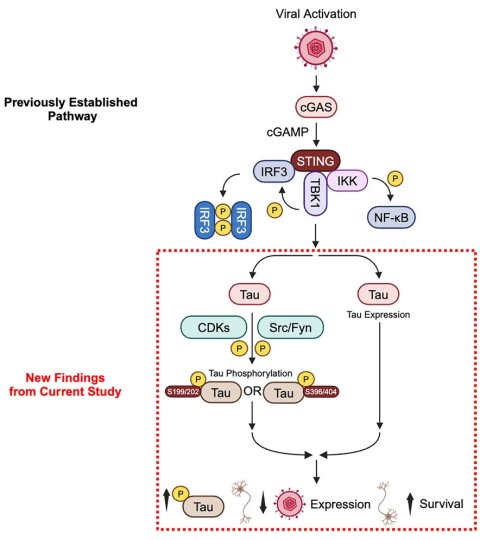News • Surprising insights
Herpes infection might drive Alzheimer's, study suggests
University of Pittsburgh researchers uncovered a surprising link between Alzheimer’s disease and herpes simplex virus-1 (HSV-1), suggesting that viral infections may play a role in the disease.

Image credit: Or Shemesh
The study results are published in Cell Reports.
The study also revealed how tau protein, often viewed as harmful in Alzheimer’s, might initially protect the brain from the virus but contribute to brain damage later. These findings could lead to new treatments targeting infections and the brain’s immune response.
“Our study challenges the conventional view of tau as solely harmful, showing that it may initially act as part of the brain’s immune defense,” said senior author Or Shemesh, Ph.D., assistant professor in the Department of Ophthalmology at Pitt. “These findings emphasize the complex interplay between infections, immune responses and neurodegeneration, offering a fresh perspective and potential new targets for therapeutic development.”
The scientists identified forms of HSV-1-related proteins in Alzheimer’s brain samples, with greater amounts of viral proteins co-localized with tangles of phosphorylated tau – one of the hallmarks of Alzheimer’s disease pathology – in brain regions especially vulnerable to Alzheimer’s across disease stages.

Image source: Hyde VR, Zhou C, Fernandez JR et al., Cell Reports 2025 (CC BY 4.0)
Further studies on miniature models of human brains in a Petri dish suggested that HSV-1 infection could modulate levels of brain tau protein and regulate its function, a protective mechanism that seemed to decrease post-infection death of human neurons.
While the precise mechanisms by which HSV-1 influences tau protein and contributes to Alzheimer’s disease are still unknown, Shemesh and his colleagues plan to explore those questions in future research. They aim to test potential therapeutic strategies that target viral proteins or fine-tune the brain’s immune response and investigate whether similar mechanisms are involved in other neurodegenerative diseases, such as Parkinson’s disease and ALS.
Other authors of the study are Vanesa Hyde, Chaoming Zhou, M.D., Juan Fernandez, Krishnashis Chatterjee, Ph.D., Pururav Ramakrishna, Amanda Lin, Gregory Fisher, Ph.D., Orhan Tunç Çeliker, Jill Caldwell, and Leonardo D'Aiuto, Ph.D., all of Pitt; Omer Bender, Ph.D., and Daniel Bar, Ph.D., both of Tel Aviv University; and Peter Joseph Sauer and Jose Lugo-Martinez, Ph.D., both of Carnegie Mellon University.
Source: University of Pittsburgh
03.01.2025





